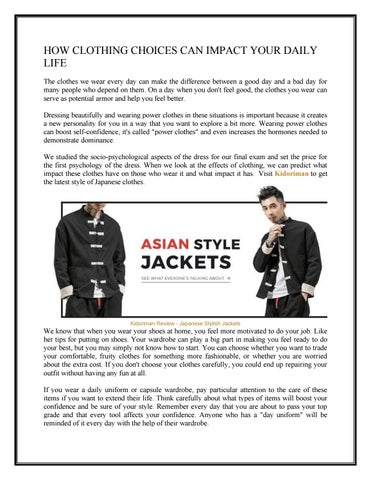When it comes to getting dressed in the morning, most of us probably don’t give it much thought. We pick out our clothes based on personal style, comfort, or functionality. But have you ever stopped to consider how what we wear can actually affect our behavior and mindset? As someone who has always had a fascination with fashion, I have come to realize that clothing is more than just a superficial aspect of our lives. It can act as a form of armor, influencing our confidence, attitude, and even our interactions with others.
Growing up, I was always intrigued by the way certain individuals seemed to exude confidence effortlessly. They walked into a room, heads held high, radiating an air of self-assuredness that was almost palpable. And upon closer inspection, I realized that their impeccable style played a significant role in their overall demeanor. It was as if their clothing choices acted as an external representation of their internal strength and self-belief.
In my personal experience, I’ve noticed a distinct difference in my own behavior depending on what I’m wearing. When I dress in clothes that make me feel confident and put-together, I notice a positive shift in my mindset. My posture improves, I stand taller, and I speak with conviction and assurance. On the other hand, when I’m clad in sweatpants and an oversized hoodie, my demeanor tends to be more relaxed, but perhaps at the cost of feeling fully present and engaged in the world around me.
Psychological studies support the idea that our clothing choices can significantly impact our behavior. One such study conducted by Professor Adam Galinsky and his colleagues at Northwestern University explored the concept of “enclothed cognition.” They found that what we wear can influence not only how others perceive us but also how we perceive ourselves. Participants in the study who wore a white lab coat associated with the medical profession displayed heightened attention to detail and performed better on tasks requiring close attention compared to those who wore street clothes.
This phenomenon can be explained by the concept of self-perception theory, which suggests that we infer our attitudes and beliefs by observing our own behavior. In other words, if we dress the part, we start to embody the characteristics associated with that role. This theory can be seen in action in professional settings where individuals may feel empowered and authoritative when dressed in a tailored suit or a power suit for women.
But it’s not just in professional or formal settings where clothing can impact behavior. Everyday casual wear also has an effect. For example, wearing workout clothes can motivate individuals to exercise, as it serves as a visual reminder of their fitness goals. Similarly, wearing vibrant colors or patterns can evoke positive emotions and increase energy levels, leading to a more outgoing and sociable demeanor.
It’s important to note that clothing as armor doesn’t imply that we should dress solely to conform to societal expectations or to please others. Instead, it highlights the power of clothing to act as a tool for self-expression and self-confidence. It’s about finding that perfect outfit that makes you feel like you can conquer the world, regardless of whether it follows the latest fashion trends or not.
Additionally, the influence of clothing extends beyond just personal behavior. It can also affect how others perceive and interact with us. Research has shown that people tend to make assumptions and form judgments about others based on their attire within seconds of meeting them. This “snap judgment” phenomenon means that our clothing choices create a lasting impression, influencing how we are evaluated, hired, or even approached by others.
Understanding the impact of clothing on behavior allows us to be more conscious of the messages we convey through our style choices. It empowers us to use our clothing as a tool for self-expression, allowing us to communicate our individuality, values, and aspirations to the world. Whether we opt for bold patterns and vibrant colors or stick to minimalist designs, our clothing becomes an extension of our personality, helping us navigate the world with confidence and authenticity.
In the end, fashion is far from just a trivial aspect of our lives. It is a powerful means of self-expression and personal empowerment. By selecting clothing that reflects our true selves and makes us feel strong and confident, we can step into any situation ready to take on the world. So, the next time you reach into your closet, remember that the clothes you choose have the potential not only to transform your outer appearance but also to shape your inner mindset and behavior.
